The collection “Croatian legal history 1790-1918“, consisting mostly of books from the old collection, is divided into three sections:
1. Sources
2. Legislative power
3. Judicial power
1. Sources for Croatian legal history



Austro-Ugarska from 1867 - 1918
The development of Croatian legal history was greatly influenced by the fact that, from 1102 until 1918, Croatia was constitutionally linked to Hungary, first within a personal union (both Croatia and Hungary were ruled by the same king), and as of 1527 within the Habsburg Monarchy.
The Habsburg dynasty strove to subordinate Croatia to the principles of royal, and later enlightened, absolutism. As a consequence, Croatians were forced to lead a joint struggle with Hungarians against Austrian centralism. In 1790 they succeeded in acquiring state independence from Joseph II. However, Austrian centralism was only replaced by the Hungarian equivalent.
Throughout the nineteenth century, therefore, the Croatian position within the Austro-Hungarian Monarchy - especially within the context of the Croatian-Hungarian Agreement - was one of a permanent struggle for the preservation of both state and nation.
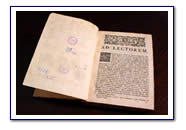
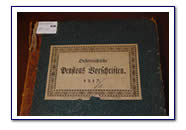
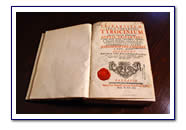
From the collection:
Croatian authors
Kukuljević Sakcinski, Ivan: Privilegia Libertas Regni Croatiae, Dalmatiae , Slavoniae, Zagreb, 1862.
Kukuljević Sakcinski, Ivan: Acta Croatica, Zagreb, 1863.
Šulek, Bogoslav: Naše pravice. Izbor zakonah, poveljah i spisah znamenitih za državno pravo Kraljevine dalmatinsko-hrvatsko-slavonske od 1202. do 1868., Zagreb, 1868,
Polić, Martin: Parlamentarna povijest Kraljevina Hrvatske, Slavonije i Dalmacije, Zagreb, 1899.
Tkalčić, Ivan: Povjestni spomenici slob. Kralj. grada Zagreba priestolnice kraljevine dalmatinsko-hrvatsko-slavonske, Zagreb, 1889.
Strohal, Ivan: Statuti primorskih gradova i općina, Zagreb, 1911.
Tomašić, Nikola: Temelji državnoga prava hrvatskoga kraljevstva , Zagreb, 1910.
Smičiklas, Tade: Diplomatički zbornik Kraljevine Hrvatske, Dalmacije i Slavonije, Zagreb, 1910.
Šišić, Ferdo: Hrvatski saborski spisi, Zagreb, 1912.
Laszowski, Emilij: Habsburški spomenici kraljevine Hrvatske, Dalmacije i Slavonije, Zagreb, 1914.
Foreign authors
Westenbergii, J.O.: Jcti et antecessoris principia juris, Wiennae, 1755.
Szegedi: Tripartitum juris Hungarici, Zagabriae, 1762.
Verböczy, S.: Extractus.. tripartiti juris, Pestini 1800.
Zeiler, Franz Edlen: Commentar über das allgemeine bürger. Gesetzbuch für die gesammten deutschen Erbländer der Österreichishcne Monarchie. Wien-Triest, 1812.
Hupka, Kristophs: Sätze über das peinliche Recht nach der Theresianschen Halsgerichtsordnung mit angehängten Abweichungen vom Karolinschen Rechte. Wien, 1874. (in Gothic script)
Collectio benignarum normalium resolutionum caesareo-regiarum, Pestini, 1785.
Szlemenics, Paulo: Discussio opusculi, cui nomen: Ratio Jurisprudentie Hungaricae ad ductum institutionum kelemenianarum, Posonii, 1817.
Deglivellio, Antonio: Saggio d uno studio storico-critico …di Ragusa, Ragusa, 1873.
Pellegrini-Danielli, Cesare: Sulla colonia Dalmata, Zara, 1896.
2. The legislative



System of Counties in Croatia and Slavonija
The nineteenth century found Croatia divided into ‘civil’ and ‘military’ parts. The military part of Croatia, the so-called Vojna krajina (“Military Frontier”; enlarged to include Slavonian Posavina during the reign of Maria Theresa), was subjected to the Austrian legal system and had German as the official language. The civil part – the Kingdom of Croatia – was subordinated to Hungary. The city of Rijeka had a separate political status, while the coast from Trieste to Senj was under Austria and was known as the “Austrian Coast”. Dalmatia was under Venetian rule until 1797, while Dubrovnik became a part of Dalmatia in 1814.
In the aftermath of the 1848 Hungarian Revolution and the uprising in Croatia in the same year, the Austrian empire was reorganized. As a constitutional and hereditary monarchy it consisted of the following kingdoms:
- the Kingdom of Dalmatia, Croatia and Slavonia with the Croatian coast and the city of Rijeka;
- the Hungarian Kingdom;
- Transylvania; and
- the Military Frontier (Vojna krajina), in which Croatian and Hungarian military regions were treated as a single unit.
In 1850 Croatia had a new structure of political administration with the Ban (Governor) heading the Ban's cabinet, and with independence in administrative, judicial and educational issues. The Croatian language became official.
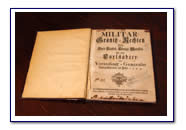
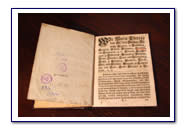
The Austro-Hungarian Compromise of 1867 created two nominally independent states - the Kingdom of Hungary and the Austrian crown lands - united by the Habsburg dynasty and common foreign and defence policy. Austria kept Dalmatia and left Croatia to reach a mutually negotiated agreement with Hungary. On the basis of the Hungaro-Croatian Agreement of 1868 both countries formed a single entity on the outside, while in internal affairs each of them constituted a separate political unit. The issue of Rijeka was left unsettled.
Bosnia and Herzegovina were under Turkish rule until 1878, when the European powers assembled at the Congress of Berlin approved the occupation of Bosnia and Herzegovina by the Austro-Hungarian Monarchy. The monarchy declared the full annexation of Bosnia and Herzegovina in 1908.
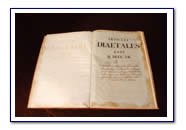
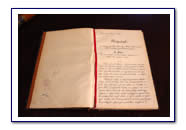
From the collection:
Austro-Hungarian Monarchy, general
Handbuch aller unter der Regierung des Kaisers Joseph des II für die K.K. Erblände erganenen Verordnungen Gesetze in sistematischen Verbindung, Wien, 1785-1790.
Sammlung der Gesetze unter der glorreichsten Regierung der König Leopold II, Wien, 1790-1792.
Zeiller, Franz Edlen: Vorbereitung zur neuesten Österreichischen Gesetzkunde im Stra- und Civil- Justizsache …, Wien und Triest, 1810.
Sammlung der Gesetze welche unter der glorreichsten Regierung der Kaiser Franz des II, Wien, 1792. -1848.
Kingdom of Croatia, Slavonia and Dalmatia
Dnevnik Sabora Trojedne kraljevine Dalmacije, Hrvatske i Slavonije 1861.-1887.
Stenografički zapisnici Sabora Kraljevine Hrvatske, Slavonije i Dalmacije
1887-1918.
Sbornik zakona za Kraljevinu Hrvatsku i Slavoniju 1863.-1926.
Sbornik Ugarsko-hrvatskih skupnih zakonah 1871.-1917.
Zemaljsko-zakonski i vladni list za Krunovinu Horvatsku i Slavoniu 1850.-1859.
List zakonah i spisah vlade za Krunovinu Dalmaciu 1849.-1916.
Raccolta delle leggi ed ordinanze per la Dalmazia dell anno 1819-1848.
Vojna krajina (Military Frontier)
Zbirku zakonah i naredabah za Vojnu Krajinu, 1871.
List zemaljske uprave za Hrvatsko -slavonsku vojnu krajinu 1872-1881.
Militär-Gränitz-Rechten… für das Karlstädter und Varasdiner-Generalat, Wien, 1754. (in Gothic script)
Stopfer, M.: Erläuterungen der Grundgesetze für die Carlstädter-Warasdiner Militär Gränze, Wien, 1831.
Bosnia and Herzegovina
Zbornik zakona i naredaba za Bosnu i Hercegovinu 1881.-1922.
Zbirka naredaba za šeriatske sudove u Bosni i Hercegovini 1878-1900.
Sammlung der Gesetze für Bosnien und die Hercegovina 1878-1880.
Other countries
Gesetze … für das österreichisch-ilirische Küstenland 1883-1914.
Deželni zakonik … za Kranjsko Kronovino 1849-1914.
Zakonnik zemsky ralovstvi Českeho 1883-1914.
Landesgesetz... für das Königreich Galizien … 1883-1908.
Landesgesetz... für das Herzogthum Steiermark 1883-1913.
3. Judicial power



The second half of the nineteenth century saw Croatia achieve independence in judicial affairs.
Following a judicial reform in 1850, the Banski stol court was formed as a Croatian high court with appelate jurisdiction. During the so-called absolutist period (when Vienna tried to reassert central control over the Monarchy in the years between 1850 and 1867), appeals against the decisions of this court were filed with the Supreme Court of Cassation in Vienna. Until the dissolution of the Austrian consulate in Bosnia and Herzegovina, the Banski stol court decided on appeals on their decisions as well.
In 1862 the Royal Chamber of Seven was founded in Zagreb as the supreme court of the Kingdom of Dalmatia, Croatia and Slavonia, presided over by the Ban.
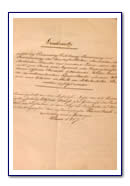
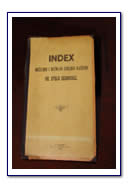
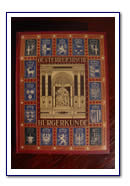
From the collection:
Croatia
Ustanovljenja u pogledu privremene uredbe o sudovah za Krunovinu Hrvatsku i Slavoniu, Beč, 1850.
Političko i sudbeno razdijeljenje Kraljevine Hrvatske i Slavonije 1889.
Zakon o mjesnim sudovima 1876.
Statistički pregled odnošajah u kr. zemalj.kaznionah Hrvatske i Slavonije 1885.-1894.
Vrbanić, Fran: Statistika kaznenoga pravosuđa za godine 1863-1876.
Tauffer, Emil: Obrtni odnošaji u kralj. zemaljskih kaznionah kraljevinah Hrvatske i Slavonije. Povodom Zemaljske izložbe u Budimpešti godine 1885., Zagreb, 1885.
Hinković: Odvjetnički red od 1852. sa tičućimi se pojedinih ustanovah zakoni i naredbami, Zagreb, 1883.
Accurti, Milan: Rješidbe kr. stola sedmorice kao suda kasacialnoga, Zagreb, 1907.
Indeks načelnih i važnijih civilnih rješidbi kr. Stola sedmorice, Zagreb, 1913.
Načelne rješitbe kr. financ.upravnoga sudišta 1890-1895.
Ogorelica, Nikola: Kazneno procesualno pravo s osobitim obzirom na judikaturu kr. stola sedmorice i Kasacionoga suda bečkoga. Zagreb, 1899.
Austria
Edlen von Kess, Franz George: Kommentar über Josephs des Zweiten allgemeine Gerichtsordnung, Wien, 1789.
Winner, Jakob: Normalien-Sammlung für Militär Gerichte 1857-1877. (in Gothic script)
Novak, R.: Entscheidungen des k.k. Obersten Ferichtshofes in Civilsachen, Wien, 1887-1902.
Entscheidungen des k.k. Obersten Gerichts als Cassationshofes…,Wien, 1990-1918.